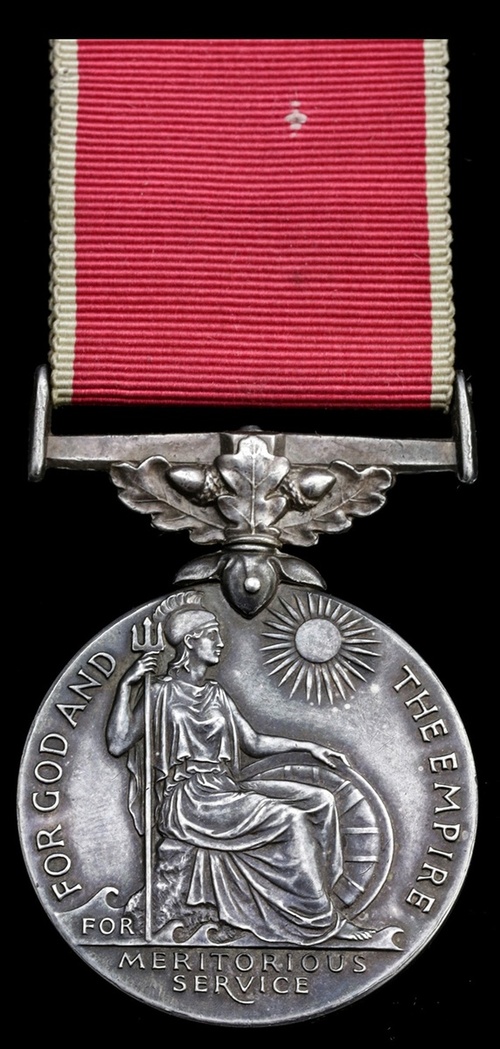
Auction: 17003 - Orders, Decorations and Medals
Lot: 708
A most unusual Second World War B.E.M. awarded to Thomas Haden, a British resident in Java who was decorated for services to his fellow prisoners whilst interned by the Japanese
British Empire Medal, Civil Division, G.VI.R. (Thomas Haden), officially engraved naming, good very fine
B.E.M. London Gazette 4 June 1946. The joint citation states:
'For services to their fellow prisoners whilst interned by the Japanese.'
Thomas Haden was born in Dudley, Staffordshire in 1906 and qualified as a chemist and mining metallurgist in the 1920s. Having found work on the West Coast of Africa between 1930 and 1938, he returned home and resided at Redcar, Yorkshire.
In February 1939, he sailed for Batavia aboard the Royal Dutch Mail Ship Marnix Van Sint Aldegonde. Interned by the Japanese in 1942 - and in common with all male civilians aged fourteen or above - he was held in one of numerous Civilian Internment Camps; inmates were continually transferred between camps throughout their captivity. Working parties were assembled every day and laboured on construction projects at various distances away from camps.
Amidst such harrowing conditions, Haden clearly came to prominence for selfless acts of devotion to his fellow inmates. He was one of three Java residents likewise honoured in the London Gazette of 4 June 1946, the others being H. D. de Brissac Bernard and Graham MacGregor; another resident, Andrew Crighton, was awarded the O.B.E.
The shared gazette heading of Haden's and H. D. de Brissac Bernard's B.E.M.s is worthy of special mention, for the latter escaped from an internment camp in mid Java:
'Months later I planned to escape from our camp because rumour had it that the women's camps were being attacked by Japanese or Javanese - we did not know - and that the young women were in severe danger.
After nearly four years internment my daughters were now about 16 and 18 years old. I had no knowledge where their camp was. All prisoners were continually moved to other camps. My son Raymond thought that when he was with them months earlier, they were in a large camp in the Batavia area.
I escaped from mid Java, another long story, leaving my son with English friends, as my attempted journey would be too difficult and dangerous to take him. It succeeded - don't ask how or why - I believe it was God's will.
I was able to enter the women's camp in the Batavia area through the help of an interned British Officer who was permitted by the Japanese to allow a working party of some 15 interned soldiers to enter the women's camp, to help clearing piles of stinking, crawling rubbish, help with fire wood, etc. I joined that working party.
In a camp of some 10,000 women and children - appalling sights - I found the family thanks to another miracle. I asked a Dutch lady if by chance she knew of a Mrs. Connie de Brissac Bernard and she did and where in the camp they were placed.
My wife was in a very advanced stage of Beri-Beri. My elder daughter, who could not stand up from the ground and was recovering from Typhus fever, just murmured "Hello Dad". The younger sister was trying to make pieces of wood which were too big to burn, to heat some water. Her right arm was practically useless, wrapped in bandages the length of her forearm and hand. This was due to an accident in the camp when running for help for a dying woman. The Japanese would not allow a doctor to attend and that resulted in permanent disablement.
Interned women doctors, having nothing whatsoever to help or treat the injury in any way, begged the Japanese for hours to give what they required to help my daughter. Notwithstanding that the Japanese had received and held a large store of medical supplies donated by the British and Canadian Red Cross for the P.O.Ws, they would only allow the issuing of bandages. The women doctors stated that an urgent operation was needed to save the use of the arm. Later in England an attempted operation could not bring back a normal arm and hand. My wife was treated at St. Mary's Hospital, London and due entirely to the attention and instructions of Dr. Fleming, gradually recovered.'
For further details, see:
http://web.onetel.net.uk/~globalsys/Internment%20Pics.htm
Another potential avenue of research may be sourced at the Imperial War Museum, London; Andrew Crighton, who received the O.B.E., was interviewed by the museum's department of sound in June 1990 (Catalogue no. 6223; 320 minutes, 11 items).
Subject to 20% VAT on Buyer’s Premium. For more information please view Terms and Conditions for Buyers.
Sold for
£400




